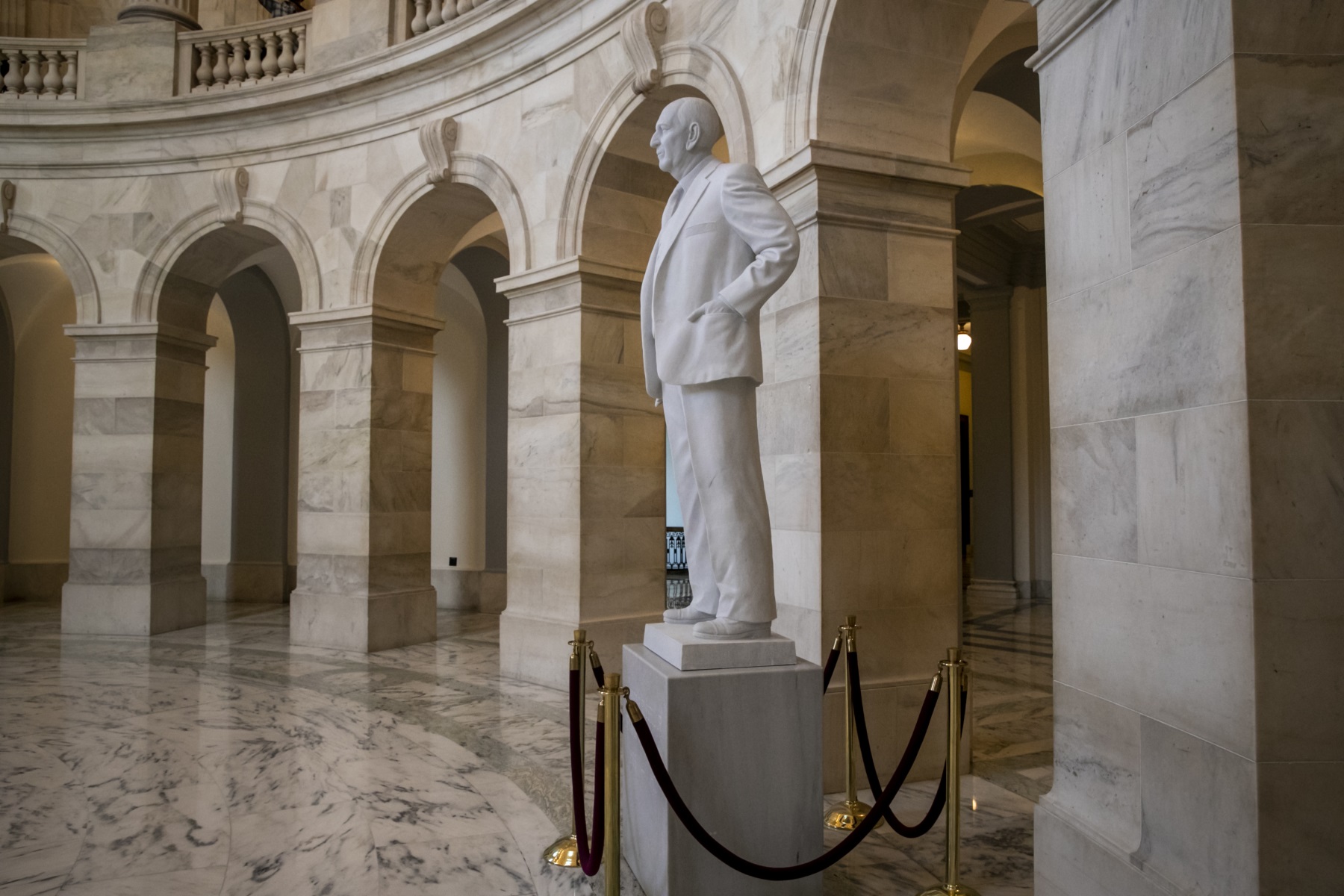Georgians React To Proposal To Rename Russell Senate Building

A statue of Sen. Richard Russell of Georgia stands in the rotunda of a Senate office building named after him on Capitol Hill in Washington. After the death of Sen. John McCain of Arizona this weekend, Senate Democratic leader Chuck Schumer said he will introduce a resolution to rename the Russell Senate Office Building to honor McCain.
J. Scott Applewhite / Associated Press
Soon after Sen. John McCain’s death on Saturday, Sen. Chuck Schumer said he wants to rename a Senate office building for the Arizonan.
That building is already named for Richard Russell, a Georgia senator with a segregationist past. Russell was a Georgia state lawmaker and governor during the Depression and a U.S. senator for nearly 40 years.
He was known for his deep knowledge of Senate rules and his use of them to try to block civil rights legislation.
But there’s more to the story, said Charles Campbell, Russell’s last chief of staff.
He pointed to the original resolution to name the Russell Senate Office Building and that it passed with the support of Sens. Ted Kennedy and Edward Brooke, the only African-American senator at the time.
“He was revered by senators,” Campbell said. “They recognized that there was far, far more to Richard Russell than his opposition to civil rights legislation.”
Russell authored the National School Lunch Program legislation that guaranteed free lunches to low-income schoolchildren. He reportedly considered that his most important work. As governor, he also created the University System of Georgia and the Board of Regents.
“It’s really unfair and really irrational to judge somebody’s career by one issue, pick one low point and ignore everything else,” Campbell said. “Because nobody can meet that test. Because nobody is perfect. I mean, George Washington, Thomas Jefferson, Andrew Jackson, all owned slaves.”
Former Georgia Sen. Sam Nunn also referenced the near-unanimous resolution that named the Russell building: “As Sen. Edward Kennedy pointed out in his tribute at the time of Russell’s death, ‘through his effort, we now have a school lunch program, aid to farmers, far better education and highway construction.’ The members of the Senate trusted Richard Russell.”
While Russell was “wrong” on civil rights, Nunn said, he “made enormous contributions to America.”
“I am confident that the Senate can find appropriate ways to ‘add to’ rather than ‘subtract from’ the honors it accords its historical giants by honoring Sen. John McCain while continuing to honor Sen. Richard Russell,” Nunn said.
Schumer told NPR News that the name change would be fitting given Russell’s past and that he is getting positive feedback on the idea.
Atlanta NAACP President Richard Rose said he thinks it’s a good idea.
“I think it’s an appropriate honorarium for McCain and long overdue to stop honoring one of the most divisive issues in America, and that’s racism,” he said. “America should repudiate racism once and for all.”
At the time, only one opponent spoke out against the resolution to simultaneously name the Russell and Dirksen office buildings (for Sen. Everett Dirksen). Sen. Philip Hart of Michigan argued his opposition was not for “lack of respect for the two men whom we would honor by naming those two buildings.”
Hart said he thought it was just too soon.
“I cannot presume to suggest how the two men whom we propose to honor would feel about this, but I think they would be perfectly comfortable in letting us first consult with students of history and then let history have a little time to make suggestions to us.”
The third Senate office building was actually named for Hart in 1976, when Hart was critically ill.
Susan Youngblood Ashmore is a civil rights historian at the Oxford College of Emory University.
“For the building to be named for him, it made sense in that era because he was the giant of the Senate,” she said. In this era? She said it might be more of a debate.
Sitting Georgia Sens. Johnny Isakson and David Perdue have declined to comment on the name change idea, saying it’s too soon after McCain’s death to discuss it.
“I think [the McCain family] are the people that ought to be opining about what should be done, not a bunch of politicians,” said Isakson. “Right now, we shouldn’t be having political arguments over that. We should be having statements about John McCain and his legacy to his country.”








